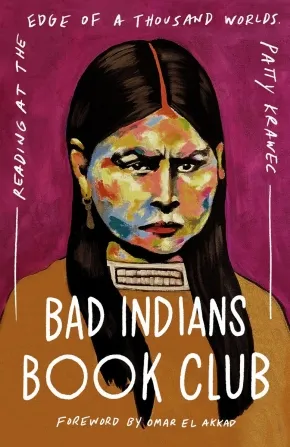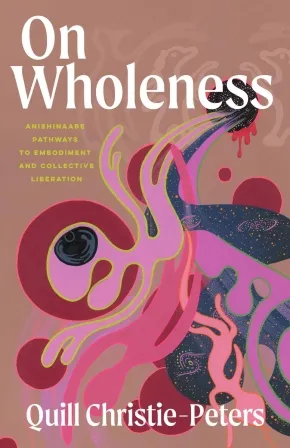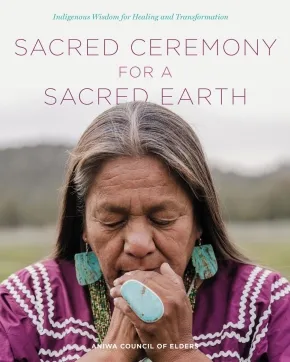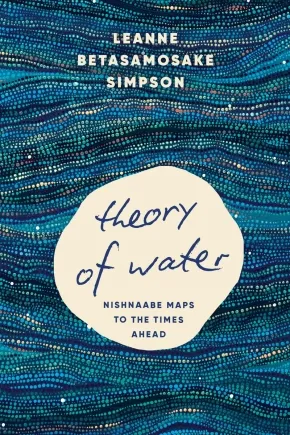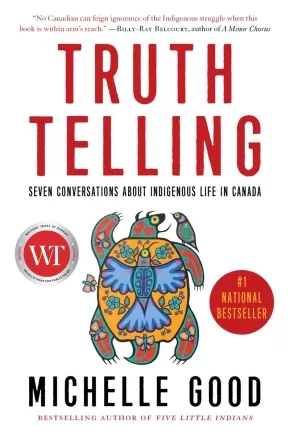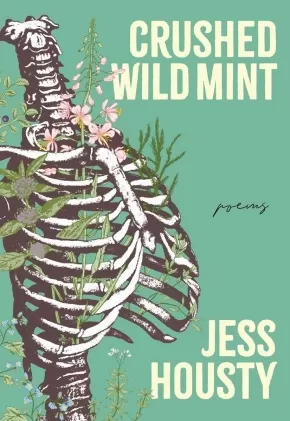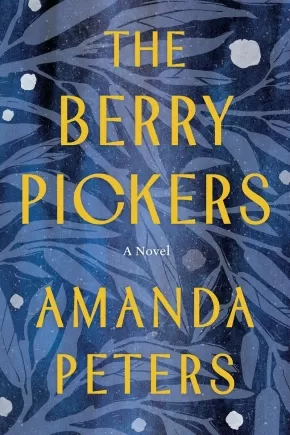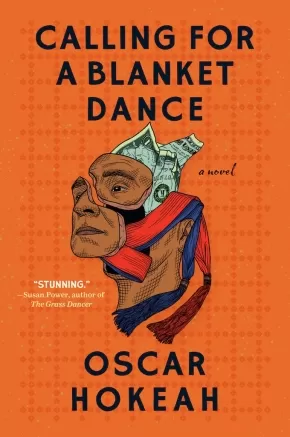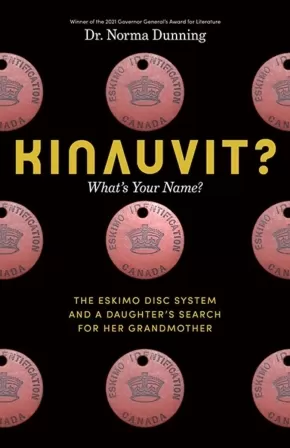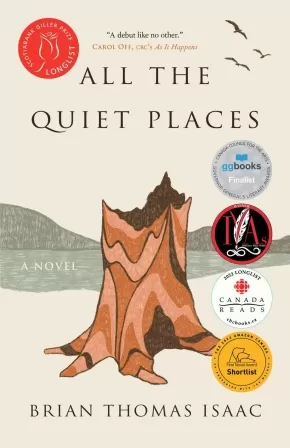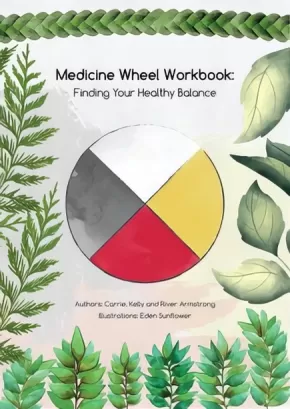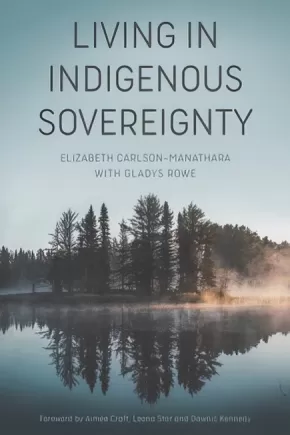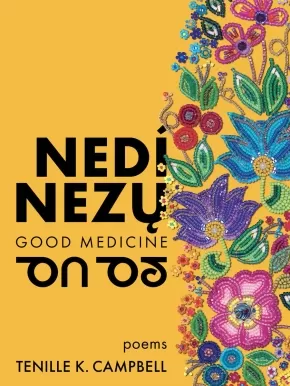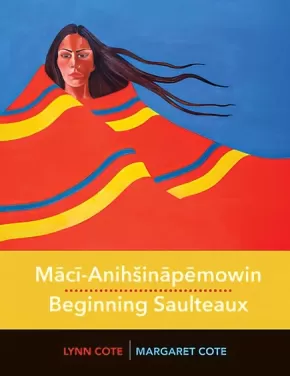ON SALE
Sales apply to IN-STOCK books only - quantities are provided in the book's title when possible.
Synopsis:
In this powerful reframing of the stories that make us, Anishinaabe writer Patty Krawec leads us into the borderlands to ask: What worlds do books written by marginalized people describe and invite us to inhabit?
Patty Krawec doesn’t want to be a “Good Indian.” When a friend asked what books could help them understand Indigenous lives, Patty Krawec gave them a list. This list then exploded into a book club, then into a podcast about a year of Indigenous reading, and then, ultimately, into this book.
Drawing on conversations with readers and authors, Bad Indians Book Club delves into writing about history, science, and gender, and into memoirs and fiction, all by “Bad Indians” and those like them, whose refusal of the dominant narrative of the wemitigoozhiwag (European settlers) opens up new possibilities for identity and existence.
Introducing each chapter with flash fiction about a shapeshifting Deer Woman, who is on her own journey to decide who she is, Krawec leads us into a place of wisdom and medicine where stories of and by marginalized writers help us imagine a thousand worlds waiting to be born.
Reviews
“Bad Indians Book Club is a compendium of worlds. From a lifetime of reading, there emerges a marriage of tapestry and map, a vision of the literary canon not as some secret handshake of the correctly educated but as a living, growing organism. . . There’s a dangerousness to a book like this. It’s not enough to define the Good Indian, the Grateful Immigrant, the Untroublesome Minority. Nor is it enough to simply reject these designations. One must interrogate how they came to hold so much power, how they offer the willing participant so many crumbs of reward from colonialism’s table.”— Omar El Akkad, author of One Day, Everyone Will Have Always Been Against This, September 2025
“Bad Indians Book Club is like a kind and protective auntie guiding you through a sometimes hostile world with sheer wisdom and wit. It’s a resounding rallying cry for our stories and our peoples. There’s no other book club I’d want to be in!”— Waubgeshig Rice, author of Moon of the Turning Leaves, September 2025
“This genre-crossing, shape-shifting, imagination-expanding book is for all who love to, and also need to, read. We tell stories to live, and this enlivening book reflects on all kinds of stories, each page suffused with Patty Krawec’s unmistakable voice and generous, timeless wisdom.”— Astra Taylor, author of The Age of Insecurity: Coming Together as Things Fall Apart, September 2025
“I didn’t want the Bad Indians Book Club to end. I read it at the perfect time, when snow was on the ground, in a period of rest and renewal. Patty Krawec made me wonder and made me ponder. Her book is a call to action to be curious, vigilant, to listen to and receive the inner strength of the land, to create and recreate community, to agitate, to investigate, to take story into ourselves and to hold the teachings sacred. As she guides us, throughout the book she tells us a new, sustaining, serial story about Kwe, Deer Woman. Such a gift. There is so much goodness in The Bad Indians Book Club!”— Shelagh Rogers, Shelagh Rogers, Truth and Reconciliaton Commission Honorary Witness, recovering broadcast journalist, September 2025
“Bad Indians Book Club is full of good medicine — challenging us to ask questions and bringing us home to ourselves. As Patty Krawec guides us into the deep wisdom wells of many people who journey in kinship, we consider how to hold the curiosity of care and stories, and what it means to imagine and create a future that integrates all our stories into a web of healing. Please buy this book, and celebrate the power of story in a weary yet flourishing world.”— Kaitlin B. Curtice, author of Living Resistance, September 2025
“In Bad Indians Book Club, Patty Krawec provides critical space for the ne'er-do-wells, disrupters, red sheep, box-busters, tricksters, and all us rowdy relatives defying expectations. Indigenous people have always been proverbial thorns in the sides of colonizers, and this piercing book does an incredible job of letting the air out of today’s imperialist narratives.”— Taté Walker, Two Spirit Lakota storyteller and community-builder, September 2025
“With Bad Indians Book Club, Patty Krawec gifts us a compelling investigation into the power of not just reading books but also doing so in community. Krawec makes the case for building your circle through reading, as a way of being in better relations with all our kin, including the land. Thinking deeply alongside other books, Bad Indians Book Club is a needed guide at a moment when books are under attack. Books are not just written culture, they are also oral culture, and Krawec illuminates this beautifully.”— Chanda Prescod-Weinstein, author of The Disordered Cosmo, September 2025
Additional Information
232 pages | 6.00" x 9.00" | Paperback
Synopsis:
The groundbreaking Indigenous style guide every writer needs.
The first published guide to common questions and issues of Indigenous style and process for those who work in words and other media is back in an updated new edition. This trusted resource offers crucial guidance to anyone who works in words or other media on how to work accurately, collaboratively, and ethically on projects involving Indigenous Peoples.
Editor Warren Cariou (Métis) and contributing editors Jordan Abel (Nisga’a), Lorena Fontaine (Cree-Anishinaabe), and Deanna Reder (Cree-Métis) continue the conversation started by the late Gregory Younging in his foundational first edition. This second conversation reflects changes in the publishing industry, Indigenous-led best practices, and society at large, including new chapters on author-editor relationships, identity and community affiliation, Two-Spirit and Indigiqueer identities, sensitivity reading, emerging issues in the digital world, and more.
This guide features:
- Twenty-two succinct style principles.
- Advice on culturally appropriate publishing practices, including how to collaborate with Indigenous Peoples, when and how to seek the advice of Elders, and how to respect Indigenous Oral Traditions and Traditional Knowledge.
- Terminology to use and to avoid.
- Advice on specific editing issues, such as biased language, capitalization, citation, accurately representing Indigenous languages, and quoting from historical sources and archives.
- Examples of projects that illustrate best practices.
Additional Information
208 pages | 5.50" x 7.50" | Paperback
Synopsis:
A brilliant exploration of the body as a site of settler colonial impact, centring embodied wholeness as a pathway to our collective liberation.
This fierce and enlightening book reimagines the way we understand settler colonialism-through the body itself. Anishinaabeg visual artist Quill Christie-Peters takes us on a journey that begins before birth, in a realm where ancestors and spirits swirl like smoke in the great beyond. But once we enter the world, our bodies are shaped and scarred by colonial forces.
In poetic and raw storytelling, Quill shares her own experiences of gendered violence and her father's survival of residential school, revealing how colonialism disconnects us from ourselves. Yet, through an Anishinaabeg lens, the body is more than just flesh-it extends to ancestors, homelands, spirit relations, and animal kin.
Through reflections on childbirth, parenting, creative practice, and expansive responsibility as pathways to wholeness, Quill explores how reconnecting with the body can be an act of resistance and healing. She shows that wholeness-despite pain and displacement-is not just possible but essential for liberation, not only for Indigenous people but for all of us.
Additional Information
288 pages | 5.50" x 8.50" | Paperback
Synopsis:
For the first time, over a dozen respected Indigenous elders from around the world have united to share their timeless wisdom beyond their lands and lineages.
Aniwa’s Council of Elders includes some of the globe’s most renowned Indigenous Wisdom Keepers. In a time fraught with ecological, social, political, and mental health crises, they share a mission to unite people of all races, colors, and creeds to promote healing and a deeper reciprocal relationship with our planet. Sacred Ceremony for a Sacred Earth brings together their profound teachings, stories, sacred ceremonies, and healing practices, amplifying the voices of Indigenous healers from diverse traditions.
In their worldview, we are all children of Mother Earth, destined to return to her embrace. This extraordinary book serves as a guiding light, beckoning humanity back to ancestral wisdom and restoring forgotten bonds with nature and self through ceremonies and practices.
Embark on a journey of self-discovery, unveiling the purpose of your soul and reclaiming your intrinsic relationship with Mother Earth, through ancient practices such as:
- Use of Feathers to Bless Yourself and Relieve Pain
- Pagamento for Trees
- Hopi Message of Comfort to Say Good-Bye to Loved Ones Who Have Passed
- Practices for Conscious Conception
- Create a Spiritual House for Your Inner Child
- The Feagaiga (Sacred Promise or Covenant) with Mother Earth
- Connect with Your Ancestors
Sacred Ceremony for a Sacred Earth calls upon us to awaken and rekindle the flame of connection with our roots and the natural world. Let the eternal wisdom of elders guide you toward healing, growth, and a profound reconnection with nature.
Reviews
"An essential guide to begin understanding culture, nature, and yourself."—Oona Chaplin, actress
"Beautifully and profusely illustrated throughout with full color photography of indigenous people, rituals, events, Sacred Ceremony for a Sacred Earth is informative, fascinating, insightful, and unreservedly recommended."—Midwest Book Review
Educator Information
Discover rituals and wisdom from Indigenous communities across the globe that, until now, have only been passed down orally and taught within closed circles.
Additional Information
224 pages | 8.30" x 10.25" | Hardcover
Synopsis:
Acclaimed Nishnaabeg writer Leanne Betasamosake Simpson takes a revolutionary look at that most elemental force, water, and suggests a powerful path for the future.
A genre-bending exploration of that most elemental force-water-through Indigenous storytelling, personal memory, and the work of influential artists and writers.
For many years, Leanne Betasamosake Simpson took solace in skiing--in all kinds of weather, on all kinds of snow across all kinds of terrain, often following the trail beside a beloved creek near her home. Recently, as she skied on this path against the backdrop of uncertainty, environmental devastation, rising authoritarianism and ongoing social injustice, her mind turned to the water in the creek and an elemental question: What might it mean to truly listen to water? To know water? To exist with and alongside water?
So began a quest to understand her people's historical, cultural, and ongoing interactions with water in all its forms (ice, snow, rain, perspiration, breath). Pulling together these threads, Leanne began to see how a "Theory of Water" might suggest a radical rethinking of relationships between beings and forces in the world today. In this inventive work, Simpson draws on Nishnaabeg origin stories while artfully weaving the work of influential writers and artists alongside her personal memories and experience--and in doing so, reimagines water as a catalyst for radical transformation, capable of birthing a new world.
Theory of Water is a resonant exploration of an intricate, multi-layered relationship with the most abundant element on our planet--one that, as Simpson eloquently shows, is shaping our present even as it demands a radical rethinking of how we might achieve a just future.
Additional Information
224 pages | 5.50" x 8.25" | Hardcover
Synopsis:
A bold, provocative collection of essays exploring the historical and contemporary Indigenous experience in Canada.
With authority and insight, Truth Telling examines a wide range of Indigenous issues framed by Michelle Good’s personal experience and knowledge.
From racism, broken treaties, and cultural pillaging, to the value of Indigenous lives and the importance of Indigenous literature, this collection reveals facts about Indigenous life in Canada that are both devastating and enlightening. Truth Telling also demonstrates the myths underlying Canadian history and the human cost of colonialism, showing how it continues to underpin modern social institutions in Canada.
Passionate and uncompromising, Michelle Good affirms that meaningful and substantive reconciliation hinges on recognition of Indigenous self-determination, the return of lands, and a just redistribution of the wealth that has been taken from those lands without regard for Indigenous peoples.
Truth Telling is essential reading for those looking to acknowledge the past and understand the way forward.
Reviews
“With blistering clarity, Michelle Good exposes the contradictions at the heart of Canada, but also imagines beyond them, setting out a specific vision for an Indigenous future governed by us. Good’s essays, woven with personal testimony, are deeply researched and traverse great swaths of history and policy; they are also very rousing and moving. No Canadian can feign ignorance of the Indigenous struggle when this book is within arm’s reach.” — Billy-Ray Belcourt, author of A Minor Chorus
"Good reminds us what the truth in Truth and Reconciliation actually requires of all of us: Indigenous peoples and Canadians. Addressing storytelling and historical myth-making, this book would have changed my nineteen-year-old world had it been available and rendered normative for my teachers. Good’s work is formidable, elemental and reminiscent of Cardinal’s Unjust Society. This work, should be required reading for every Canadian. Smart, generous and insightful. 'There is no such thing as Crown Land. It is all Indigenous land.' Good writes. This truth resonates. Serves notice: it is time." — Dr. Tracey Lindberg, Law Professor, author of Birdie
“Truth Telling is at once heartfelt, instructive, and authentic, expertly exploring the key issues that have shaped the Indigenous reality in Canada.… This collection is an indispensable resource.” — Waubgeshig Rice, author of Moon of the Crusted Snow
“As Canadians search for a national approach to reconciliation... this book reminds us of how we arrived at this moment.…[and] is the kind of reference that will help us navigate our fraught journey.” — Dr. Eldon Yellowhorn, Professor of Indigenous Studies, Simon Fraser University
“Truth Telling is a powerful, urgent, and necessary book that gets to the heart of true reconciliation and maps a course for achieving it. Bridging personal stories and lived experiences with sharp historical analysis, Michelle Good’s writing is both beautiful and heartbreaking. Honest, forthright, and powerful, Truth Telling offers insights and analysis that every policymaker and politician—indeed, any person who calls Canada “home”— can and must read. Urgently.” — 2023 Balsillie Prize for Public Policy Jury
Educator Information
Truth Telling is a collection of essays about the contemporary Indigenous experience in Canada.
Additional Information
232 pages | 5.00" x 7.50" | Paperback
Synopsis:
Crushed Wild Mint is a collection of poems embodying land love and ancestral wisdom, deeply rooted to the poet’s motherland and their experience as a parent, herbalist and careful observer of the patterns and power of their territory. Jess Housty grapples with the natural and the supernatural, transformation and the hard work of living that our bodies are doing—held by mountains, by oceans, by ancestors and by the grief and love that come with communing.
Housty’s poems are textural—blossoms, feathers, stubborn blots of snow—and reading them is a sensory offering that invites the reader’s whole body to be transported in the experience. Their writing converses with mountains, animals and all our kin beyond the human realm as they sit beside their ancestors’ bones and move throughout the geography of their homeland. Housty’s exploration of history and futurity, ceremony and sexuality, grieving and thriving invites us to look both inward and outward to redefine our sense of community.
Through these poems we can explore living and loving as a practice, and placemaking as an essential part of exploring our humanity and relationality.
Awards
- 2024 Bill Duthie Booksellers’ Choice Award winner
- 2024 Dorothy Livesay Poetry Award winner
Reviews
"When the mountains of your territory are your ancestors, you paint the landscapes as Jess Housty does in this evocative, powerful collection of poetry: in the language of ceremony as taut as the inner surface of a mussel shell when the meat is stripped away. Their hyperlocality is precise medicine, an expansive, generous meditation on the mutual care of mountains, the forgiving veins of rivers, all the liminal territories and beings soaked in the verdant magic of the Pacific Northwest Coast." — Eden Robinson
"I return to read and then stop to wonder, return to read and still wonder: How is this so true? Let these words love you. They’ll sing." — Michael Nicoll Yahgulanaas
Additional Information
132 pages | 5.50" x 8.00" | Paperback
Synopsis:
A four-year-old girl goes missing from the blueberry fields of Maine, sparking a tragic mystery that will remain unsolved for nearly fifty years
July 1962. A Mi’kmaq family from Nova Scotia arrives in Maine to pick blueberries for the summer. Weeks later, four-year-old Ruthie, the family’s youngest child, vanishes mysteriously. She is last seen by her six-year-old brother, Joe, sitting on her favourite rock at the edge of a berry field. Joe will remain deeply affected by his sister’s disappearance for years to come.
In Boston, a young girl named Norma grows up as the only child of an affluent family. Her father is emotionally distant, her mother frustratingly overprotective. Norma is often troubled by recurring dreams and visions that seem more like memories than imagination. As she grows older, Norma slowly comes to realize there is something her parents aren’t telling her. Unwilling to abandon her intuition, she will spend decades trying to uncover this family secret.
A stunning debut by a vibrant new voice in fiction, The Berry Pickers is a riveting novel about the search for truth, the shadow of trauma and the persistence of love across time.
Reviews
“Amanda Peters manages to take you home to the East Coast in the very best ways – through family love and personal grief and the precious accounting of minutes and memories. You cannot help but love these characters from the first chapter. They stay with you long after the last page.” — Cherie Dimaline, bestselling author of The Marrow Thieves
“The Berry Pickers is an intimate story about the destruction wreaked on a family when their youngest child goes missing. Peters brilliantly crafts a multi-layered tale about how one irrational act creates irrevocable harm that ripples through multiple lives, including the lives of the perpetrators. This is an emotional novel that is beautifully rendered. An amazing read from a talented new voice.” — Michelle Good, bestselling author of Five Little Indians
“A marvelous debut. The Berry Pickers has all the passion of a first book but also the finely developed skill of a well-practiced storyteller. The Berry Pickers is a triumph.” — Katherena Vermette, bestselling author of The Break
Additional Information
320 pages | 6.00" x 9.00" | Paperback
Synopsis:
A moving and deeply engaging debut novel about a young Native American man finding strength in his familial identity, from a stellar new voice in fiction.
Told in a series of voices, Calling for a Blanket Dance takes us into the life of Ever Geimausaddle through the multigenerational perspectives of his family as they face myriad obstacles. His father’s injury at the hands of corrupt police, his mother's struggle to hold on to her job and care for her husband, the constant resettlement of the family, and the legacy of centuries of injustice all intensify Ever’s bottled-up rage. Meanwhile, all of Ever’s relatives have ideas about who he is and who he should be. His Cherokee grandmother urges the family to move across Oklahoma to find security; his grandfather hopes to reunite him with his heritage through traditional gourd dances; his Kiowa cousin reminds him that he’s connected to an ancestral past. And once an adult, Ever must take the strength given to him by his relatives to save not only himself but also the next generation of family.
How will this young man visualize a place for himself when the world hasn’t given him a place to start with? Honest, heartbreaking, and ultimately uplifting, Calling for a Blanket Dance is the story of how Ever Geimausaddle found his way to home.
Reviews
“Calling for a Blanket Dance is a stunning novel. Oscar Hokeah writes from deep inside the heart of his communities, bringing life to generations of voices who became so real to me they felt like relatives. The reader can't help but invest in each character as they navigate bitter challenges, sometimes surprising themselves with their strength, their ability to survive and love. Hokeah's prose gorgeously weaves authentic local vernacular with the lyrical notes of hard-won insight. This novel belongs on every recommended booklist for fans of literary fiction.”—Susan Power, author of The Grass Dancer
“With solid Tommy Orange vibes, the first novel from Oscar Hokeah is a coming-of-age tale told from a chorus of multigenerational voices . . . One to watch, for sure.”—BookPage
“Filled with astonishing immediacy, and embellished with Hokeah’s authentic voice, these epic stories soar with indelible images of a proud, but challenged, people who find strength through their blood-lines and their enduring familial love. Some characters are so broken and bitter that I was moved to tears. But most characters persevere, and thrive, through the indomitable will and pride of their heritage. Hokeah has accomplished something unique here. In his quietly brilliant depiction of his Cherokee/Kiowa/Mexican heritage he has dipped into his medicine bag and gifted us with a small but compelling masterpiece. This should be required reading for every American.”—Kiana Davenport, author of Shark Dialogues
Additional Information
272 pages | 5.50" x 8.25" | Hardcover
Synopsis:
From the winner of the 2021 Governor General's Award for literature, a revelatory look into an obscured piece of Canadian history: what was then called the Eskimo Identification Tag System
In 2001, Dr. Norma Dunning applied to the Nunavut Beneficiary program, requesting enrolment to legally solidify her existence as an Inuk woman. But in the process, she was faced with a question she could not answer, tied to a colonial institution retired decades ago: “What was your disc number?”
Still haunted by this question years later, Dunning took it upon herself to reach out to Inuit community members who experienced the Eskimo Identification Tag System first-hand, providing vital perspective and nuance to the scant records available on the subject. Written with incisive detail and passion, Dunning provides readers with a comprehensive look into a bureaucracy sustained by the Canadian government for over thirty years, neglected by history books but with lasting echoes revealed in Dunning’s intimate interviews with affected community members. Not one government has taken responsibility or apologized for the E-number system to date — a symbol of the blatant dehumanizing treatment of the smallest Indigenous population in Canada.
A necessary and timely offering, Kinauvit? provides a critical record and response to a significant piece of Canadian history, collecting years of research, interviews and personal stories from an important voice in Canadian literature.
Reviews
"‘Mom, what are we’? a question asked by Inuit scholar and writer Norma Dunning, which remains like a floating specter over the course of this highly original and devastating book, vividly recalling the disembodying process of colonization. Much more than this, however, this highly personal, evocative and robustly researched amalgam of wrenching memories, historical records, and testimony, Kinauvit? What’s Your Name?, is a multi-dimensional life’s work that demonstrates the power and will of Indigenous peoples’ reclamation of self."— Brendan Hokowhitu, Professor of Indigenous Research, The University of Queensland, August 2022
Additional Information
184 pages | 5.50" x 8.50" | Hardcover
Synopsis:
Brian Isaac's powerful debut novel All the Quiet Places is the coming-of-age story of Eddie Toma, an Indigenous (Syilx) boy, told through the young narrator's wide-eyed observations of the world around him.
It's 1956, and six-year-old Eddie Toma lives with his mother, Grace, and his little brother, Lewis, near the Salmon River on the far edge of the Okanagan Indian Reserve in the British Columbia Southern Interior. Grace, her friend Isabel, Isabel's husband Ray, and his nephew Gregory cross the border to work as summer farm labourers in Washington state. There Eddie is free to spend long days with Gregory exploring the farm: climbing a hill to watch the sunset and listening to the wind in the grass. The boys learn from Ray's funny and dark stories. But when tragedy strikes, Eddie returns home grief-stricken, confused, and lonely.
Eddie's life is governed by the decisions of the adults around him. Grace is determined to have him learn the ways of the white world by sending him to school in the small community of Falkland. On Eddie's first day of school, as he crosses the reserve boundary at the Salmon River bridge, he leaves behind his world. Grace challenges the Indian Agent and writes futile letters to Ottawa to protest the sparse resources in their community. His father returns to the family after years away only to bring chaos and instability. Isabel and Ray join them in an overcrowded house. Only in his grandmother's company does he find solace and true companionship.
In his teens, Eddie's future seems more secure—he finds a job, and his long-time crush on his white neighbour Eva is finally reciprocated. But every time things look up, circumstances beyond his control crash down around him. The cumulative effects of guilt, grief, and despair threaten everything Eddie has ever known or loved.
All the Quiet Places is the story of what can happen when every adult in a person's life has been affected by colonialism; it tells of the acute separation from culture that can occur even at home in a loved familiar landscape. Its narrative power relies on the unguarded, unsentimental witness provided by Eddie.
Awards
- 2022 Indigenous Voices Awards winner
Reviews
"What a welcome debut. Young Eddie Toma’s passage through the truly ugly parts of this world is met, like an antidote, or perhaps a compensation, by his remarkable awareness of its beauty. This is a writer who understands youth, and how to tell a story." —Gil Adamson is the winner of the Writers’ Trust Fiction Prize for Ridgerunner
"All the Quiet Places is a deftly crafted, evocative story about the trials of growing up Indigenous. Brian Thomas Isaac’s characters are complex, relatable, and overall, beautifully human." —Waubgeshig Rice is the bestselling author of Moon of the Crusted Snow
"All the Quiet Places is the kind of novel that works its way into your soul. Essentially, it's a tale of childhood, all the wonders and tragedies, that befall a young boy on an Okanagan Reserve in the middle of the last century. Familiar, yet unique, Eddie's story will captivate the reader. The best compliment I could bestow on this book is. . . I wish it was one or two chapters longer. I wanted more." —Drew Hayden Taylor is from the Curve Lake First Nation and is the author of many books including Chasing Painted Horses
"On par with the brilliance of James Welch's Winter in The Blood and Ruby Slipperjack's Little Voice, Brian Thomas Isaac has given us a startling read that'll live wire your soul and haunt you for a good long while. Pure brilliance. Wow." —Richard Van Camp is the author of The Lesser Blessed and Moccasin Square Gardens
Educator Information
Keywords: Coming of Age; Own Voices; Indigenous
Recommended in the Canadian Indigenous Books for Schools resource collection as being useful for grades 11 and 12 for English Language Arts and Social Studies.
Additional Information
288 pages | 5.50" x 8.50"
Synopsis:
Many Indigenous cultures on Turtle Island recognize the Medicine Wheel as a sacred symbol. The Medicine Wheel has four equal areas; black, white, red and yellow. These areas represent the four directions, four seasons, four elements, four stages of life and four sacred plants. The Medicine Wheel represents unity and balance between all things, including living a healthy life mentally, spiritually, emotionally, and physically. By understanding the teachings of the Medicine Wheel we can gain a deeper understanding of our holistic health.
Through a careful selection of teachings, followed by interactive activities, the Medicine Wheel Workbook: Finding Your Healthy Balance will encourage children to live well and find their healthy balance. This workbook can be used as a teacher resource in your classroom or by parents teaching their children at home. Lessons and activities may be photocopied to use within your classroom or home.
Educator Information
Publisher recommends this work for grades 2 to 7. Activities are adaptable.
This book is available in French: Cahier d'exercices la roue medicinale: Trouve un equilibre sain
Additional Information
74+ pages | 8.50" x 11.00"
Synopsis:
In the last decade, the relationship between settler Canadians and Indigenous Peoples has been highlighted by the Truth and Reconciliation Commission, the National Inquiry into Missing and Murdered Indigenous Women and Girls, the Idle No More movement, the Wet'suwet'en struggle against pipeline development and other Indigenous-led struggles for Indigenous sovereignty and decolonization. Increasing numbers of Canadians are beginning to recognize how settler colonialism continues to shape relationships on these lands. With this recognition comes the question many settler Canadians are now asking, what can I do?
Living in Indigenous Sovereignty lifts up the wisdom of Indigenous scholars, activists and knowledge keepers who speak pointedly to what they are asking of non-Indigenous people. It also shares the experiences of thirteen white settler Canadians who are deeply engaged in solidarity work with Indigenous Peoples. Together, these stories offer inspiration and guidance for settler Canadians who wish to live honourably in relationship with Indigenous Peoples, laws and lands. If Canadians truly want to achieve this goal, Carlson and Rowe argue, they will pursue a reorientation of their lives toward "living in Indigenous sovereignty"-- living in an awareness that these are Indigenous lands, containing relationships, laws, protocols, stories, obligations and opportunities that have been understood and practised by Indigenous peoples since time immemorial.
Collectively, these stories will help settler Canadians understand what transformations we must undertake if we are to fundamentally shift our current relations and find a new way forward, together.
Reviews
“A powerful decolonial reflection and call to action for settler peoples to learn how to work in solidarity with Indigenous peoples in ways that are decolonizing not recolonizing. Guided by teachings from Indigenous elders, scholars, and activists about the importance of creating relationships with kindness, humility, mutual respect and reciprocity, non-Indigenous readers can find inspiration in the life stories of settlers who speak frankly about their ongoing struggles to do this work in a good way.” — Paulette Regan, author of Unsettling the Settler Within: Indian Residential Schools, Truth Telling, and Reconciliation in Canada and Senior Researcher/Lead Writer of “Reconciliation,” Volume 6 of the TRC Final Report
“This is the most comprehensive book on anti-colonial practice focused on non-indigenous peoples. It draws on leading scholars and advocates from across the country and incorporates a breadth of concepts that create a solid and encompassing foundation for creating change. By incorporating these ideas, perspectives, experiences and practices, non-Indigenous and Indigenous people will be well prepared for our work and parallel journey ahead.” — Michael Anthony Hart, Vice Provost (Indigenous Engagement), Professor, Faculty of Social Work, University of Calgary, author of Seeking Mino-Pimatisiwin and Wicihitowin
Educator Information
Tables of Contents
Foreword By Aimée Craft, Leona Star and Dawnis Kennedy
Acknowledgments
Introductions
Settler Colonialism and Resistance
Introducing the Narratives
Monique Woroniak
Murray Angus
Steve Heinrichs
Franklin Jones
Orienting Toward Indigenous Sovereignty
Joy Eidse
Adam Barker
Susanne McCrea
Kathi Avery Kinew
Rick Wallace
What Indigenous Peoples Have Asked of Us
John Doe
Silvia Straka
Dave Bleakney
Victoria Freeman
Honourings
Conclusions
Afterword
References
Index
Additional Information
264 pages | 6.00" x 9.00"
Synopsis:
A celebratory, slyly funny, and bluntly honest take on sex and romance in NDN Country.
nedi nezu (Good Medicine) explores the beautiful space that being a sensual Indigenous woman creates - not only as a partner, a fantasy, a heartbreak waiting to happen but also as an auntie, a role model, a voice that connects to others walking the same path. From the online hookup world of DMs, double taps, and secret texts to earth-shakingly erotic encounters under the northern stars to the ever-complicated relationship Indigenous women have with mainstream society, this poetry collection doesn't shy away from depicting the gorgeous diversity in decolonized desire. Instead, Campbell creates the most intimate of spaces, where the tea is hot and a seat is waiting, surrounded by the tantalizing laughter of aunties telling stories.
These wise, jubilant poems chronicle many failed attempts at romance, with the wry humour needed to not take these heartbreaks personally, and the growth that comes from sitting in the silence of living a solo life in a world that insists everyone should be partnered up. With a knowing smile, this book side-eyes the political existence and celebrates the lived experience of an Indigenous woman falling in love and lust with those around her -but, most importantly, with herself.
nedi nezu is a smart, sensual, and scandalous collection dripping in Indigenous culture yet irresistible to anyone in thrall to the magnificent disaster that is dating, sex, and relationships.
Reviews
"Since I was hit on by someone using lines from #IndianLovePoems and immediately went out to buy it, I've been eagerly waiting for Tenille K. Campbell's next collection. What a joy and a blessing to find myself in pages as intimate as staying up late with your best friend sharing truths, as hot as meeting your next lover's gaze, and as sharp as a mean auntie. nedi nezu cements Campbell's reputation as the matriarch of decolonized desire." -Eden Robinson, author of Trickster Drift
"There are many kinds of intimacy in Tenille Campbell's delicious second collection: that of laughing lovers entangled in damp sheets under the star-strewn northern sky; that of a Dene/Metis woman dreaming her relations with the living land, its histories, and its futures; that of a formidably talented woman in all her complex contexts - poet, scholar, mother, lover - who shifts with ease between evocations of knee-trembling desire, wry humour, tender kindness, and aching loneliness. The poems are a love-language that honours the messy, meaningful complexities of sensual self-determination, the fierce assertion of an Indigenous woman's embodied and visionary power. We are lucky indeed to have the restorative gift of Campbell's work in this ever more alienating world. Read it, share it, be transformed." -Daniel Heath Justice, author of Why Indigenous Literatures Matter
"Dare we all have such an opportunity to revel in the intimate oratories of Tenille K. Campbell's matriarchy. She asks us to 'know that we are in ceremony' as she undertakes an album of sensual and sexual vignettes rinsed clean of seeds in gentle spring waters. Alternatively, she interrogates fatphobia, Indigenous masculinities, academia, heteropatriarchy, and untangles the ways in which poetry hinges on the pervasive in the stratosphere of social media. Campbell shows us yet again why Indigeneity is wholly and irrevocably erotic by nature." -Joshua Whitehead, author of Jonny Appleseed
Educator Information
Caution: Mature language.
Additional Information
92 pages | 6.00" x 8.00"
Synopsis:
Mācī-Anihšināpēmowin / Beginning Saulteaux is an introductory look at one of the most widely spoken of all North American Indigenous languages, regionally known as Saulteaux, Ojibway, Ottawa (Odawa), Chippewa, and Algonquian. In an easy-to-use and easy-to-read series of lessons, both designed for self-study or for use in the classroom, Beginning Saulteaux will guide beginners through the language’s grammatical structures and spelling systems, as well as everyday terms and phrases. The book grounds the language in both traditional and contemporary contexts, and sheds light on the Saulteaux world view. For example, there is no word for good-bye in the language, so upon parting people will usually say Kika-wāpamin mīnawā, meaning “I’ll see you again.”
Educator & Series Information
The third in our Indigenous Languages for Beginners series, Beginning Saulteaux is an invaluable resource produced in consultation with Elders, Language Keepers, and community members, and continues our commitment to revitalizing Indigenous languages.
Additional Information
304 pages | 8.50" x 11.00" | Spiral Bound

